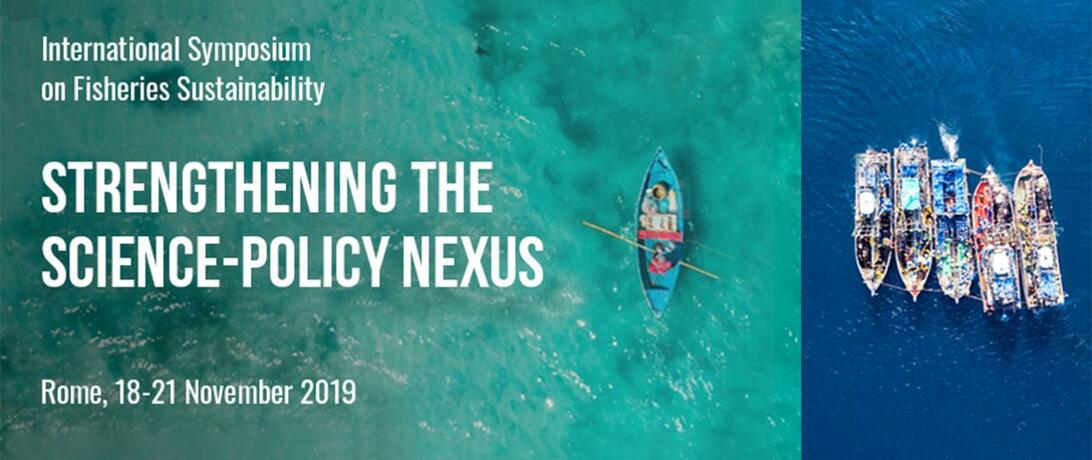
Small-scale fisheries are having a large impact on fisheries policies around the world.
This impact was highlighted in November, when leaders from the global fishing sector, fisheries scientists and managers, and non-governmental organizations (NGOs) convened in Rome for the United Nations Food and Agriculture Organization’s International Symposium on Fisheries Sustainability. The symposium theme, “Strengthening the Science-Policy Nexus,” represents a goal shared by Secure Fisheries as we support cooperative management (co-management) and data collection in Somali fishing communities to build management that ensures sustainable livelihoods.
The symposium topics were wide-ranging, but some overarching lessons resonated. There is a distinct movement toward more inclusion of small-scale fisheries in data collection, management planning, and fishing sector improvements. With the specter of climate change looming, learning from and managing for those who will be most impacted is vital to securing their livelihoods and food sources. Though the sector was previously deprioritized in favor of large-scale commercial fishing, the international community is now shifting toward supporting small-scale fisheries first and industrial fishing second.
Here are six takeaways from the symposium that exemplify this evolving global mindset:
-
Better communication across all sectors and groups will lead to greater inclusivity, which, in turn, leads to stronger fisheries governance.
-
Small-scale fishers, industrial fishers, fisheries-sector workers and communities, scientists, governments, and external change agents often do not speak the same language, which results in policies that exclude some groups. Added to this miscommunication is a historic lack of engagement with local communities and native groups because of their contribution to national and global fish catch being perceived as insignificant; exclusion of women’s voices through systemic cultural marginalization despite their large presence in the fishing sector, especially in postharvest activities; and the power of industry to draw managers’ attention through their large catch and economic impact. Efforts to bridge these gaps are becoming mainstream, including community engagement projects and improving science communication, making it easier for everyone to understand each other.
-
-
There is not one solution that will work for all fisheries...
-
There have been many efforts to create management tools that can be widely applied, often in the form of top-down management from central governments. Applying one system to all fisheries is futile as every country, community, and fishery is different. Instead, managers can build capacity and systems that incorporate community feedback, directing effort to where it will make the biggest difference and allowing for flexibility in changing environments.
-
-
...but policy continuity is necessary and can be based on existing frameworks.
-
While one solution cannot work for all fisheries, utilizing proven guidelines to formulate management will harmonize policies among communities and countries and bring managers’ attention to overlooked groups. The Voluntary Guidelines for Securing Sustainable Small-Scale Fisheries in the Context of Food Security and Poverty Eradication (“SSF Guidelines,” for short) offers a useful point of entry to begin designing these systems in places where small-scale fisheries need greater attention from policymakers.
-
-
Having some data is better than having no data.
-
Fisheries management has traditionally relied on having large amounts of data. However, approaches for data-poor fisheries do exist: from tried-and-true methods like using traditional knowledge to inform management to innovative technology that can fill information gaps through big-data analysis and even artificial intelligence. Creative approaches to data collection and analysis are making it easier to use diverse forms of information to develop equitable, inclusive policies.
-
-
Some management is better than no management.
-
Overfishing and environmental degradation are “global problems with local solutions,” a sentiment echoed by many keynote speakers. The days of open-access as a viable option for small-scale fisheries are long past. Small-scale fisheries are estimated to account for nearly one quarter of global catch and must be managed as such. While small-scale fisheries may lack stock assessments or robust data-driven management plans, basic forms of management can conserve livelihoods.
-
-
New technology can assist in every case, not just in the most developed countries.
-
Open systems, more affordable technology, more widespread connectivity, and innovative software design combined with widespread, improved understanding of the benefits of technology are allowing it to be used more widely by governments and by fishers themselves.
-
Threaded through all six of these considerations is the need to adapt global fisheries management to be more flexible. As the climate changes, fisheries will necessarily change as well, and management plans will need to adapt so that no one is left behind. The lessons learned from our collective global fisheries experience are powerful tools to apply to future challenges if we can cooperate on solutions.
The full symposium proceedings were recorded and can be found on the symposium website along with the slide decks of all presentations and additional materials. The conference outcomes report is forthcoming.
Article Details
Published
Topic
Program
Content Type
Opinion & Insights